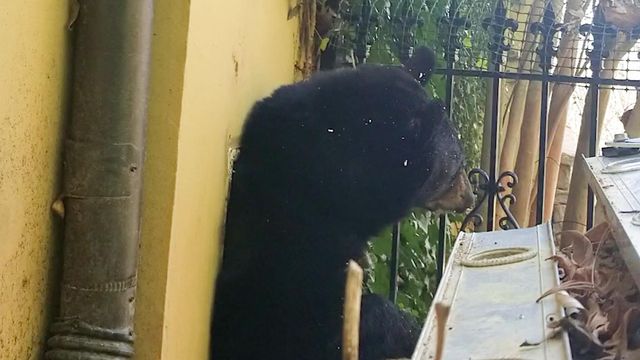NC Wildlife: See a bear den? Leave it alone
If you see a bear or a bear den, leave it alone, biologists at the N.C. Wildlife Resources Commission are urging people.
Posted — UpdatedIf you see a bear or a bear den, remain calm and leave it alone, biologists at the N.C. Wildlife Resources Commission urge.
In the coldest months of the year, black bears in North Carolina look for dens to keep warm -- but in doing so, they might get close to humans.
According to N.C. Wildlife, bears look for shelter between December and April, creating dens in rock and tree cavities, in brush piles, in excavations under fallen trees, in ground nests and even under the decks and crawlspaces of homes, officials say.
Humans can safely coexist with bears
According to N.C. Wildlife, in most cases homeowners can safely co-exist with the bear until it leaves the den in the spring.
It's especially important to give bear dens adequate space, because a black bear mother disturbed by a human or pet may abandon her cubs, N.C. Wildlife said.
“We have experienced an uptick in bears denning under houses and decks over the last 10 years, as well as unleashed dogs disturbing bears in dens,” said Colleen Olfenbuttel, a bear expert at N.C. Wildlife.
Olfenbuttel explained bears in dens will not disturb humans because they are "only interested in getting their winter rest or, if it’s a female, caring for her cubs."
“The bear seems to have given birth in early January, when the homeowners were alerted to the sound of cubs crying under their deck,” said Ashley Hobbs, N.C. Wildlife's BearWise coordinator. “After speaking with the homeowners and inspecting the den site, we recommended the best course of action was to limit disturbance around the deck area until the bear emerges with her cubs in the spring. This will avoid disturbing the female and potentially orphaning the cubs.”
Hobbs also developed a plan for the homeowners to close the space under the deck once the bears vacate to prevent future access by bears and other wildlife.
Black bear sightings increase this spring
According to officials, bear sightings may become more frequent in the spring as black bears emerge from their dens.
"Bears are not aggressive by nature," according to a post by N.C. Wildlife. "Because it’s mating season, young males are getting kicked out by their mothers and are moving out on their own to establish new areas and find a female. They often don’t know where they’re going and sometimes end up in urban areas."
If you see a bear in an urban area, it is just passing through, wildlife officials say. Steer clear of the bear and do not harm it.
If you see a bear cub alone, it is probably just waiting for its mother. You can take note of the location, leave and call the N.C. Wildlife Helpline if you suspect the bear is abandoned.
Never approach a bear or try to feed it.
Related Topics
• Credits
Copyright 2024 by Capitol Broadcasting Company. All rights reserved. This material may not be published, broadcast, rewritten or redistributed.






